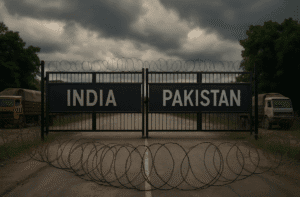India-Pakistan Tensions Explode: 7 Shocking Consequences of the Trade Ban That Could Ignite War
Following a militant attack in Kashmir that killed 26 tourists, India banned all imports from Pakistan and barred its ships from Indian ports, escalating decades-old hostilities. Pakistan retaliated by halting cross-border trade, expelling diplomats, and restricting airspace, further straining a relationship already crippled by dwindling bilateral trade (down 90% since 2013). The crisis risks inflaming water disputes under the fragile Indus Waters Treaty, with Pakistan warning that tampering with river flows could be deemed an “act of war.”
Economically, border communities face collapse, while geopolitically, China and Western powers tread cautiously to avoid destabilizing South Asia. India’s move, framed as a national security imperative, aligns with Prime Minister Modi’s hardline stance ahead of elections, though critics call it symbolic given minimal trade ties. With both nations weaponizing diplomacy and resources, Kashmir’s civilians—caught in cycles of violence and economic despair—bear the brunt, underscoring the urgent need for dialogue over retaliation in a region where miscalculations could have global consequences.

India-Pakistan Tensions Explode: 7 Shocking Consequences of the Trade Ban That Could Ignite War
In the wake of a devastating militant attack on tourists in Kashmir’s Pahalgam region, which claimed 26 lives, India has imposed an immediate ban on all imports from Pakistan and barred Pakistani ships from its ports. This move, framed as a national security measure, intensifies the decades-long rivalry between the nuclear-armed neighbors and underscores the fragile state of their bilateral relations.
The Catalyst: Kashmir’s Unending Strife
The attack in Pahalgam, a scenic valley often dubbed “Heaven on Earth,” marks one of the deadliest assaults on civilians in Kashmir in recent years. India has long accused Pakistan of supporting militant groups in the region—a claim Islamabad vehemently denies. Pakistan, meanwhile, alleges India plans military retaliation and has retaliated by halting cross-border trade, expelling Indian diplomats, and restricting airspace access.
Economic Fallout: A Trade Relationship on Life Support
India’s ban targets all goods originating from or transiting through Pakistan, dealing a symbolic blow to an already dwindling economic relationship. Bilateral trade, which peaked at $2.7 billion in 2013, plummeted to $280 million by 2023 following prior escalations, such as India’s revocation of Pakistan’s Most-Favored Nation (MFN) status after the 2019 Pulwama attack. Key traded items—like Indian pharmaceuticals and Pakistani textiles—now face further disruption, disproportionately impacting small businesses and border communities reliant on informal trade.
For instance, Punjab’s Attari-Wagah border, once a bustling trade corridor, now sees idle trucks and job losses among local laborers. “This isn’t just about politics; it’s about our livelihoods,” laments a Amritsar-based trader, reflecting the human cost of geopolitical strife.
Navigating the Water Wars Threat
A less visible but critical flashpoint is the Indus Waters Treaty (IWT), a 1960 agreement mediated by the World Bank that allocates river resources between the nations. Pakistan’s recent warning that interference with water flows would be “an act of war” highlights the treaty’s fragility. India’s potential to leverage water resources as a strategic tool—such as by diverting rivers feeding Pakistan—could escalate tensions beyond Kashmir, threatening agricultural economies and regional stability.
Geopolitical Ripples: Regional and Global Implications
The crisis reverberates beyond South Asia. China, Pakistan’s ally and India’s regional rival, faces a delicate balancing act. While Beijing has historically supported Islamabad, its substantial trade ties with India ($135 billion in 2022) may temper overt involvement. Conversely, the U.S. and EU, invested in Indo-Pacific security, are likely to press for de-escalation, though their influence remains limited given India’s steadfast stance on sovereignty.
Domestically, India’s decision aligns with Prime Minister Narendra Modi’s hardline security policies, particularly as national elections loom. Critics argue the ban serves more as political posturing than a strategic masterstroke, given the minimal economic stakes.
Pathways to De-Escalation: A Precarious Balance
History suggests India and Pakistan might eventually resume backchannel diplomacy, as seen after the 2019 Balakot strikes. However, the inclusion of water disputes and maritime restrictions complicates resolution efforts. Neutral mediation or multilateral forums like the Shanghai Cooperation Organisation (SCO) could provide platforms for dialogue, yet mutual distrust remains a barrier.
Conclusion: A Cycle of Retaliation with No Winners
The latest measures reflect a deepening cycle of retaliation, where security concerns override economic pragmatism. While the import ban’s immediate impact is limited, its symbolic resonance risks entrenching hostility. For Kashmiri civilians and border communities, the human toll continues to mount—a stark reminder that in the India-Pakistan conflict, lasting peace remains the only path to genuine security.
As both nations navigate this crisis, the world watches closely, aware that miscalculations in one of the globe’s most volatile regions could have consequences far beyond their borders.
You must be logged in to post a comment.